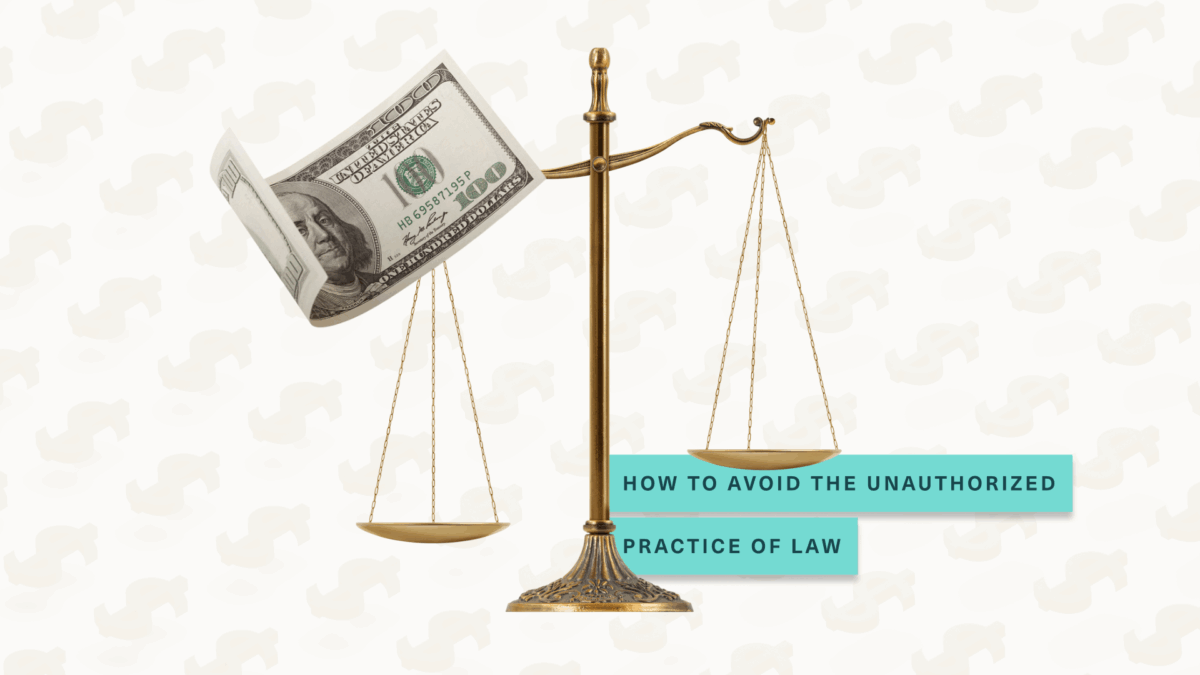By Jim Doppke, Esq., Robinson Stewart Montgomery & Doppke LLC
Financial advisors can assist clients in planning for their financial future, and their families’ futures, in many ways, and an important component of a holistic plan for financial well-being is an estate plan. Advisors who don’t have law licenses are not permitted to practice law.
Traditionally, lawyers have assisted clients with creating an estate plan. However, modern estate planning technology designed by lawyers now puts the power in the clients’ own hands, including by assisting their clients in creating an estate plan to weigh their personal situations against their legal options, and to create their own estate plans.
How can advisors make sure that they adequately address their client’s needs, while providing only the services they are authorized to provide?
What is the Practice of Law?
Only lawyers, or someone acting under their direct supervision, can engage in “the practice of law.” But how do we know what “the practice of law” is? The term doesn’t have a precise definition, but many authorities define it generally as performing any service that involves legal knowledge or legal skill. The “practice of law” can also be said to involve applying a legal principle to specific facts, even hypothetical facts that haven’t actually arisen.
Regulatory authorities have analyzed companies that provide estate planning services to consumers – especially services particularly relating to Living (or Revocable) Trusts. For example, in the estate planning space, one regulator found that a non-lawyer crossed into the practice of law by concluding, on behalf of another person (e.g., a client), that the person should have a Revocable Trust based on that person’s facts and circumstances. That’s because the decision of which estate planning vehicle is most appropriate for another person involves applying legal principles to that other person’s specific situations. That is the practice of law. If someone is not able to determine the appropriate estate planning vehicle for themselves, then a lawyer must identify whether a Will or Trust is most appropriate for that person.
So how can Wealth.com help?
Using Wealth.com
If a Wealth.com user is uncertain whether the foundational document for their estate plan should be a Will or a Revocable Trust, Wealth.com presents the user with an intake quiz. That quiz contains the factors that an attorney might normally use to determine if a Will or a Trust is most appropriate. The user responds to the prompts based on their own circumstances, and is presented with an option for a will-based plan or a trustbased plan – and with explanations for how the information they provided was reflected in the option presented. Importantly, the user then may choose one route over the other. Throughout the process, the advisors serving Wealth.com users do not give legal advice or legal services to the users.
Using the Advisor Dashboard, the advisor can review some of the information that the client enters into the software. But the advisor does not enter that information. Nor does Wealth.com allow advisors to edit or create estate planning documents, or provide legal advice to clients about what legal means or objectives to pursue. The advisor can, however, review the client’s information – including, for example, summaries of key terms in estate planning documents and designations of trustees – and, if need be, refer the client to an attorney for legal advice about particular estate planning documents. At every stage in the process, Wealth.com makes advisors and clients aware that they are not giving or receiving legal advice or legal services.
Using the Wealth.com Advisor portal, the advisor can review the information that the client enters into the platform and send nudges and reminders to the client. That helps to make sure that the client completes the Wealth.com process. But the advisors themselves cannot make elections or decisions that could have a legal effect on behalf of the client, such as editing or creating estate planning documents, and they cannot provide legal advice to clients about what legal means or objectives to pursue, or how to pursue them.
The advisor also has full visibility into the client’s estate plan and tools. They can receive visual reports that help summarize, digest, and understand the structure and key provisions within the client’s estate plan. If need be, the client or advisor can generate a report that contains insights into the client’s estate plan. That report can highlight opportunities for updates, and it can signal when the client might want to consult with an attorney within Wealth.com’s carefully vetted network of trusts and estates attorneys.
At every stage in the process – and as early as the client registration process – Wealth.com makes advisors and clients aware that the advisor is not giving or receiving legal advice or legal services.
Legal Information & Financial Advice
What kind of advice can advisors give to clients?
While advisors must avoid giving legal advice – applying legal principles to specific facts – they can provide clients with both legal information and financial advice.
Legal information is factual and generic. It does not address any one particular client or set of facts. Governmental or regulatory websites often contain legal information regarding the statutes that govern a particular industry or area, and regarding an agency’s processes. As long as advisors do not analyze legal information with regard to the client’s particular situation, or recommend specific actions in light of the legal information, they can pass that kind of information along to clients.
Financial advice consists of recommendations of certain investments, products, or vehicles designed to help consumers meet their present and future financial goals. Financial advisors can analyze a client’s assets, liabilities, and other financial data in order to assist in planning the client’s strategies and holdings. Qualified financial advisors who are not authorized to practice law can provide many kinds of financial advice, as long as they do not draft legal documents, speculate on legal outcomes, or recommend that the client choose one particular legal course of action over another.
Examples
Below are some examples of the kinds of services an advisor using Wealth.com to assist his clients might provide, and brief discussions of whether those services could be considered the unauthorized practice of law (UPL).
- Providing the client the text of an IRS Alert: Not UPL, unless accompanied by specific advice, or recommendations for courses of action, based on the client’s particular circumstances.
- Advising the client regarding stock market trends with a view to making sure client has allocated assets appropriately for their goals: Not UPL, as this would be financial advice.
- Noticing that the client has no Will or Trust and advising the client what kind of estate planning document would be appropriate under the circumstances: Potentially UPL, as the advice involves determining a legal course of action. Wealth.com’s intake quiz can help guide the client in the right direction. Or an advisor can guide the client to seek legal advice, including by using Wealth.com’s network of attorneys.
- Noticing that the client has no Will or Trust and providing the client with access to Wealth.com for assistance in creating estate planning documents: Not UPL, as advisor is suggesting that the client seek appropriate assistance and directs client to the platform, on which the client can create documents for themselves.
- Noticing that a particular provision in a client’s Trust could cause assets to be distributed in a manner not in accord with client’s wishes, and advising the client to change that provision: Potentially UPL, as the application of laws to the client’s situation could give rise to giving legal advice. To avoid UPL, the advisor can provide the client with access to Wealth.com so that client can enter and analyze their own estate plan information. Or the advisor can recommend that the client seek the advice of an attorney, including one of the attorneys within Wealth.com’s network.
- Conducting a meeting with the client where the client clicks through the platform and makes decisions through the document creation workflows: Not UPL as long as the advisor does not answer questions regarding the legal implications of choices the client makes beyond the generalized information from the FAQs or other educational materials provided by Wealth.com.
- Suggesting to the client that either the client or the financial advisor can reach out to Wealth.com support if there are further questions: Not UPL. The Wealth.com support team is trained to triage, and to answer factual or product-related questions. Any legal questions are then forwarded to the legal department, which can then direct the client to the consulting attorneys in Wealth.com’s network for further assistance.
Contact Wealth.com today to start helping your clients to effectuate their estate plans and to achieve their financial goals. See the platform in action at www.wealth.com/demo.



